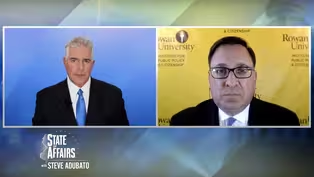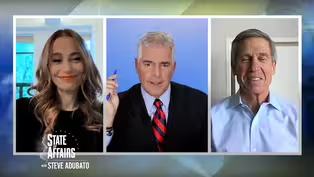State of Affairs with Steve Adubato
President of NJ BPU addresses clean energy in NJ
Clip: Season 8 Episode 24 | 7m 45sVideo has Closed Captions
President of NJ BPU addresses clean energy in NJ
Steve Adubato is joined by Christine Guhl-Sadovy, President of the New Jersey Board of Public Utilities, to examine the energy grid, fluctuating electric prices, and New Jersey’s clean energy commitment.
Problems playing video? | Closed Captioning Feedback
Problems playing video? | Closed Captioning Feedback
State of Affairs with Steve Adubato is a local public television program presented by NJ PBS
State of Affairs with Steve Adubato
President of NJ BPU addresses clean energy in NJ
Clip: Season 8 Episode 24 | 7m 45sVideo has Closed Captions
Steve Adubato is joined by Christine Guhl-Sadovy, President of the New Jersey Board of Public Utilities, to examine the energy grid, fluctuating electric prices, and New Jersey’s clean energy commitment.
Problems playing video? | Closed Captioning Feedback
How to Watch State of Affairs with Steve Adubato
State of Affairs with Steve Adubato is available to stream on pbs.org and the free PBS App, available on iPhone, Apple TV, Android TV, Android smartphones, Amazon Fire TV, Amazon Fire Tablet, Roku, Samsung Smart TV, and Vizio.
Providing Support for PBS.org
Learn Moreabout PBS online sponsorship[INSPRATIONAL MUSIC STING] - Hi everyone, Steve Adubato.
We kick off the program with the President of the Board of Public Utilities in New Jersey.
Christine Guhl-Sadovy.
Christine, good to see you, Madam President.
- Good to see you, Steve.
- You got the logo right there in the corner.
I see that.
Tell everyone what the Board of Public Utilities is.
We'll put up the website right now.
- Great, so the Board of Public Utilities is the state department that regulates our public utilities, electric, gas, water.
And we also are the state's Office of Clean Energy and Office of Broadband.
And we help advance the governor's clean energy goals and expand broadband throughout the state of New Jersey.
- Along those lines, let me disclose that, through a third-party, an ad agency that the BPU retained, we have a grant to do public awareness around clean energy for full disclosure purposes.
Christine, let me ask you this.
Energy prices, if you will, we had an interview with Rich Henning from the Utilities Association.
He's trying to explain the grid and how it, you know, energy companies buy off the grid.
And, simple explanation if we can do that.
Why the heck are energy prices higher, electric energy prices higher?
Our bills higher?
- I'll try to be as simple in my explanation as possible, so- - I'm simple, so I need a simple explanation.
(both laughing) - So, you know, people care about their bills, right?
If your bill is high, then you care what your rate is.
If your bill is low, maybe you care less about what your rate is.
So the majority of your electric bill, as we all know it, is the cost of energy generation.
So the state of New Jersey procures energy through our utilities, through an auction process and the cost of energy generation fluctuates.
And there are a lot of reasons that that might be the case.
The tightening of supply and demand is certainly a big part of that.
Energy is a commodity when there are conflicts and we rely on things like natural gas and other fossil fuels, those are finite resources and world conflicts can have a lot to do with the cost of energy.
As we do more electrification and expand things like broadband, we're gonna see an increase in demand.
And so we're going to see an associated rise in costs.
And then, you know, of course, we have to invest in our grid to ensure that we have safe and reliable electricity and that costs money.
And so to make sure that our grid is stable and that we, you know, reduce the number of outages and provide that electric service we have to make those grid investments through the utilities.
- Christine, I actually understood that, which is- - Great.
- I hope everyone did too.
So let me try this.
Governor just, literally, as we're doing this program, we're taping it on the 12th.
It'll be seen after the 12th of November.
You and the governor committed to clean energy.
But there's things going on in the new administration, Trump administration, Congress, talking about what they think should and shouldn't be done in this regard, you and the governor just as committed as you've been to clean energy, correct?
- Absolutely.
So the state of New Jersey, under Governor Murphy's leadership, has a goal of 100% clean energy by 2035.
A big part of that is our offshore, you know, our goals around offshore wind.
But it also includes things like solar and energy storage, and of course, you know, supporting our nuclear generation, which is roughly 40% of our clean generation in New Jersey.
And we are 100% committed, both the governor and myself, to ensuring that we meet those goals.
It's really not just about, you know, climate change.
We wanna make sure that New Jersey is doing its part to mitigate climate change, but it's also about public health, reducing pollution.
And Steve, really importantly, energy independence.
When we invest in our resources here in New Jersey, like offshore wind, like solar, and around the region, we ensure that we're not relying on other countries and issues around the world to provide energy for the residents of New Jersey.
- Got it, and let me be clear.
As we're taping, there are lots, there are issues in the courts, let's say, that could play out a lot of different ways.
The date will be up there on the screen as to when we're dating, when we're having this program, having this conversation.
So things are gonna change.
That being said, Madam President, let me try this, Christine.
When you talk about energy independence, when people use the expression, and I asked Rich Henning this from the Utilities Association, they have these slogans, "Drill, Baby Drill."
When they talk about fracking, as if that's the solution.
Isn't it much more complex than that?
- So Steve, absolutely.
You know, when we think about our goal of 100% clean by 2035, we are looking at it from a quick portfolio standpoint.
As I pointed out, we have a significant amount of nuclear generation.
You know, we also are on our way to five gigawatts of solar.
For a state, that is as geographically small and densely populated as New Jersey, that's an incredible achievement.
We're also looking at energy storage as a way to ensure that when we are relying on intermittent resources like offshore wind and solar, we have the appropriate base load support so that we're not, you know, risking reliability.
That's our number one goal is ensuring that we have safe and reliable electric service for our residents and we're committed to that along with our goal of 100% clean energy.
- So over a decade ago, Hurricane Sandy happens, the grids impacted.
We learned from that.
- Absolutely.
You know, we learned about things like redundancy, ensuring that we have redundant support for our resources, making sure that things like substations are more flood-resistant, right?
That's so important as we think about things like sea level rise.
But now Steve, even, you know, not catastrophic events like Hurricane Sandy, even smaller weather events that we're seeing much more frequently where we have high winds, excessive rains, though not right now, obviously, we're in a drought, but those events can cause outages and we need to make sure that the grid can support everyone's power needs every day, not just, you know, and not just only while we have these really significant weather events.
- Hopefully, what the president just said about being in a drought is also dated a month or so when this is seen and there is not a drought, but Christine- - Let's hope so.
- Yeah, Christine Guhl-Sadovy, President of the Board of Public Utilities in the great state of New Jersey.
Christine, thank you so much for joining us.
We appreciate it.
- Thank you Steve.
Great to see you.
- You got it.
Stay with us, we'll be right back.
- [Narrator] State of Affairs with Steve Adubato is a production of the Caucus Educational Corporation.
Celebrating 30 years in public broadcasting.
Funding has been provided by PSE&G, Holy Name.
Robert Wood Johnson Foundation.
Johnson & Johnson.
New Jersey Sharing Network.
New Brunswick Development Corporation.
Delta Dental of New Jersey.
Community FoodBank of New Jersey.
And by NJM Insurance Group.
Promotional support provided by New Jersey Globe.
And by NJBIZ.
- (Narrator) Since 1903, PSEG has worked to keep our commitment to customers and communities, to keep your lights on and homes warm.
We’re there when challenges strike like storms or economic uncertainty.
We're preparing for tomorrow by working to replace aging infrastructure, provide carbon free nuclear energy, and deliver energy efficient options to customers.
PSEG, powering progress.
The future of polling and key voter issues behind elections
Video has Closed Captions
Clip: S8 Ep24 | 9m 55s | The future of polling and key voter issues behind elections (9m 55s)
The impact of the new Trump administration’s policies
Video has Closed Captions
Clip: S8 Ep24 | 10m 56s | The impact of the new Trump administration’s policies (10m 56s)
Providing Support for PBS.org
Learn Moreabout PBS online sponsorship
- News and Public Affairs

Top journalists deliver compelling original analysis of the hour's headlines.

- News and Public Affairs

FRONTLINE is investigative journalism that questions, explains and changes our world.












Support for PBS provided by:
State of Affairs with Steve Adubato is a local public television program presented by NJ PBS

